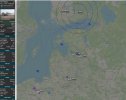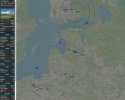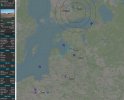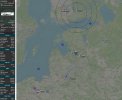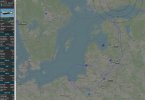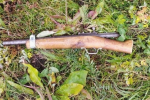The UN’s atomic energy watchdog said it is ready to hold talks in Russia and Ukraine on setting up a protection zone around the Zaporizhzhia nuclear power plant.
The head of the International Atomic Energy Agency (IAEA), Rafael Grossi, said he met the foreign minister from both countries at the UN General Assembly last week to discuss the possibility of a protection zone.
“This must be done, and I am ready to continue these consultations in both countries so we can protect this plant,” he said.
“The work there will allow us to stabilise the situation that is simply unacceptable. And I’m convinced that it’s something we can do.
He insisted there must be an end to the war and the IAEA must do everything in its power to prevent a nuclear accident that “would add tragedy to the suffering”.

Russia-Ukraine war: Russian conscripts being sent straight to front, Ukraine says; Kremlin yet to make decision on closing borders – live
Untrained conscripts being sent directly to Ukraine frontline, Kyiv claims; long queues at Russian borders as hundreds attempt to flee country
Germany is furiously debating whether, and if so, under what conditions, it should be giving asylum to some of the tens of thousands of Russian war refuseniks, conscientious objectors and deserters who are seeking asylum abroad.
Interior Minister Nancy Faeser said Germany is potentially prepared to give protection to deserters from anywhere in the world who face hard repercussions if they refuse to fight, but that cases will have to be decided on an individual basis amid security concerns. Experts are warning of the high likelihood that agents of the federal security service, FSB – successor to the KGB – might use the opportunity to infiltrate the country.
Security expert Christoph de Vries has warned Vladimir Putin might use this chance to try to “smuggle large numbers of Russian agents into Germany”, but asylum experts have also urged the government to be wary of the fact that those who refuse to fight face persecution at home.
The interior ministry has also been keen to point out that this legislation, recently introduced by the EU, will protect Germany from a huge flow of Russians entering the country.
Berlin is keen for there to be a joint European stance, not least wary of the fact that if it officially signals its readiness to give asylum to Russian males, it could be inundated with hundreds of thousands of them and their families.
Other European countries, such as Poland, have refused to do so, while Latvia and Estonia have introduced a ban on Russians entering their countries, and Finland is in the process of doing so, after 20,000 reportedly crossed over the border at the weekend. Slovakia meanwhile, has said it will decide very carefully on a case by case basis.
Ukraine’s Armed Forces general staff has claimed some Russian conscripts from the Kremlin’s mass mobilisation are being sent directly to the frontlines in Ukraine without training.
Amid warnings from the UK’s Ministry of Defence and other experts that many of those conscripted were likely to get little meaningful training – and faced the risk of “high rates of attrition” when deployed – men recently mobilised by pro-Russian occupation officials in Ukraine were also being readied for the frontline.
Those included newly drafted personnel in Crimea as well as conscripts in the Luhansk region who have received draft summonses in recent days.
The latest moves came as it was reported that Russia has also closed its border to occupied areas of Ukraine with the neighbouring Rostov region for entry and exit ordering locals to appear at military enlistment offices within three days
The first wave of Russian conscripts have begun arriving for training in Russia amid widespread scepticism among outside western analysts over what impact the call up was likely to have on Russian capabilities in Ukraine.
Following Ukraine’s success in retaking thousands of square kilometres of territory in the Kharkiv region, heavy fighting was reported on Monday morning including in the area of Lyman in the Donetsk region.
Unconfirmed reports in the past 24 hours described Russian lines collapsing in some areas while video posted on social media was described as showing Ukrainian armour moving through at least one former Russian position littered with burned out vehicles.
“The lack of military trainers, and the haste with which Russia has started the mobilisation, suggests that many of the drafted [Russian] troops will deploy to the front line with minimal relevant preparation,” said the UK MoD.
The US based Institute for the Study of War was also highly dubious about how the likely effectiveness of the Russian mobilisation.
Noting that the Kremlin “is unlikely to overcome fundamental structural challenges.”



 (varsinkin kun paska maa estää länsivaunujakaan saamasta)
(varsinkin kun paska maa estää länsivaunujakaan saamasta) life will win.
life will win.

